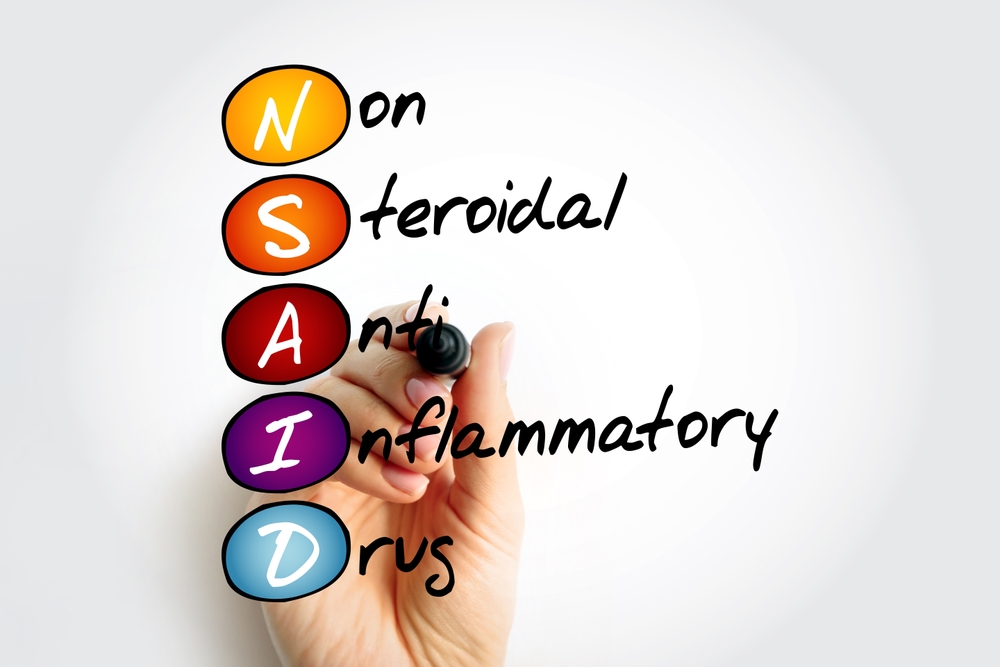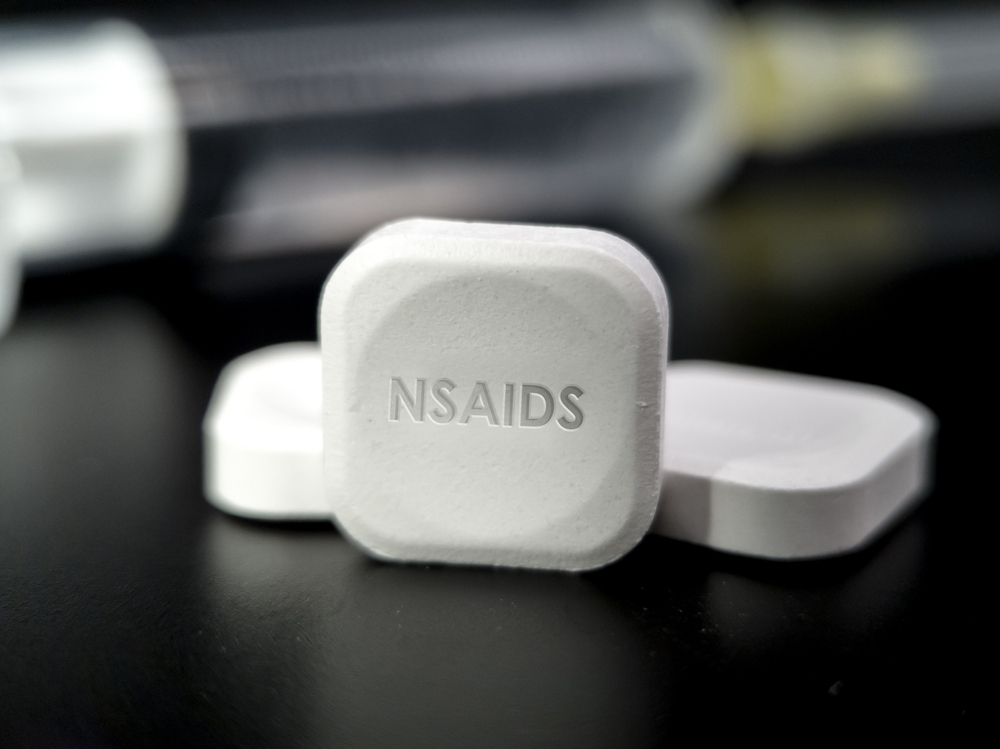Nonsteroidal anti-inflammatory drugs (NSAIDs) are widely used medications that provide pain relief and reduce inflammation.1 They are commonly prescribed for conditions such as rheumatoid arthritis, osteoarthritis, tendonitis, and muscle aches. However, it is important to be aware of the risks associated with NSAID use, including severe gastrointestinal bleeding, cardiovascular complications, and kidney damage. This article will delve deeper into the risks of these drugs and provide comprehensive information on safer alternatives for pain management.
Understanding NSAIDs

NSAIDs work by blocking the production of prostaglandins, chemicals in the body that cause pain and inflammation. Generally speaking, there are two types: nonselective, which blocks both COX-1 and COX-2 enzymes, and selective, which primarily blocks COX-2 enzymes.2 Nonselective, such as aspirin, ibuprofen, and naproxen, are available over the counter, while selective options like celecoxib require a prescription.
Read More: Marijuana-Infused Gum for Digestive Pain Relief: Would you chew some?
Risks Associated

- Gastrointestinal Complications3: One of the most significant risks associated with NSAIDs is severe or life-threatening gastrointestinal bleeding and ulcers. These medications can cause irritation and damage to the stomach lining, leading to bleeding and the formation of ulcers. It is crucial to inform your doctor if you have a history of ulcers, gastrointestinal bleeding, or digestive disorders before taking NSAIDs.
- Cardiovascular Complications: Long-term use of NSAIDs has been linked to a higher risk of strokes, heart attacks, and heart-related deaths, especially when used for an extended period or at high doses. The exact mechanisms behind these cardiovascular complications are not fully understood, but NSAIDs are believed to interfere with blood clotting and promote inflammation within the blood vessels. Discussing your cardiovascular health with your doctor before starting NSAID treatment is crucial.
- Kidney Damage: high blood pressure from extended use can lead to kidney damage, particularly in individuals over the age of 60. These medications can affect the blood flow to the kidneys and disrupt normal kidney function. If you have a kidney or liver disease history, it is important to inform your doctor before taking NSAIDs.
Side Effects

While most people tolerate NSAIDs well, they can still cause side effects. Common side effects include gas, bloating, heartburn, stomach pain, nausea, and mild headaches. These side effects are generally mild and resolve on their own. However, there are more serious side effects that require immediate medical attention. These include swelling of the mouth, face, or limbs; severe rash or hives; unexplained bleeding or bruising; chest pain; and difficulty breathing. If you experience any of these severe side effects, it is important to seek medical help immediately.
Use During Pregnancy

The use of NSAIDs during pregnancy is somewhat controversial. Use during the third trimester is generally not recommended due to an increased risk of complications in the newborn. There is also evidence suggesting that prescription-strength NSAIDs during the first half of pregnancy may increase the risk of miscarriage. However, any use during pregnancy should be evaluated on a case-by-case basis, considering the specific condition being treated and the potential risks to both the mother and the fetus. It is important to consult with your healthcare professional before taking any NSAIDs during pregnancy.
Read More: Pressure Points in Your Feet: Use This Foot Massage Chart for Pain Relief
Safer Alternatives to NSAIDs

Considering all the risks involved with NSAIDs, it is worth looking at safe alternatives that are available to you on the market.
Acetaminophen

Acetaminophen is an effective pain reliever less likely to cause gastrointestinal complications. It works by reducing pain signals in the brain. However, following the recommended dosage and avoiding exceeding the maximum daily limit is important to prevent liver damage. Acetaminophen is available over the counter and can be an effective alternative for mild to moderate pain relief.
Topical NSAID

Available in the form of creams or gels, these can provide localized pain relief with a lower risk of systemic side effects. These medications are applied directly to the affected area and can be particularly useful for joint and muscle pain. They work by reducing inflammation at the site of application.
Nonacetylated Salicylates

Nonacetylated salicylates, such as choline magnesium trisalicylate, are an alternative for individuals who want to avoid gastrointestinal damage and excessive bleeding. These medications provide pain relief and reduce swelling with less risk to the stomach. However, it is important to consult a healthcare professional before starting nonacetylated salicylates, as they may not be best for everyone.
Herbal Remedies

Certain herbal remedies have shown potential in relieving pain and reducing inflammation. Arnica, curcumin (derived from turmeric), bromelain (found in pineapples), and topical capsaicin (derived from chili peppers) are among the herbal remedies that have been studied for their pain-relieving properties. However, it is important to note that scientific evidence supporting their ability to fix this problem is limited, and it is wise to consult with a professional before using herbal remedies.
Alternative Therapies

Non-pharmacological options such as acupuncture and yoga have been shown to lower pain in certain conditions rather than using NSAIDs. Acupuncture involves the insertion of thin needles into specific points on the body to stimulate nerves and promote pain relief. Yoga mixes physical postures, breathing exercises, and meditation to improve flexibility, strength, and overall well-being. These alternative therapies can be used with other treatment modalities to manage pain effectively. It is important to consult with a qualified practitioner to ensure the safe and appropriate use of these therapies.
Conclusion

While NSAIDs are commonly used for pain relief and swelling, it is crucial to be aware of the risks. Severe gastrointestinal bleeding, cardiovascular complications, and kidney damage are among the potential side effects of long-term use. Safer alternatives such as acetaminophen, more topical options, nonacetylated salicylates, herbal options, and alternative therapies should be considered. It is important to consult with a healthcare professional to determine the most appropriate pain management strategy based on individual needs, medical history, and any potential drug interactions.
Read More: Cannabis Gum: Would You Try Chewing Your Way To Pain Relief?
Sources
- “What Are NSAIDs?” Everyday Health. Julie Lynn Marks.
- “Side Effects from NSAIDs.” Healthline. Marjorie Hecht. July 23, 2019.
- “Safer Alternatives to NSAIDs.” Very Well Health. Rebeca Schiller. February 10, 2022.
Disclaimer: This information is not intended to be a substitute for professional medical advice, diagnosis or treatment and is for information only. Always seek the advice of your physician or another qualified health provider with any questions about your medical condition and/or current medication. Do not disregard professional medical advice or delay seeking advice or treatment because of something you have read here

